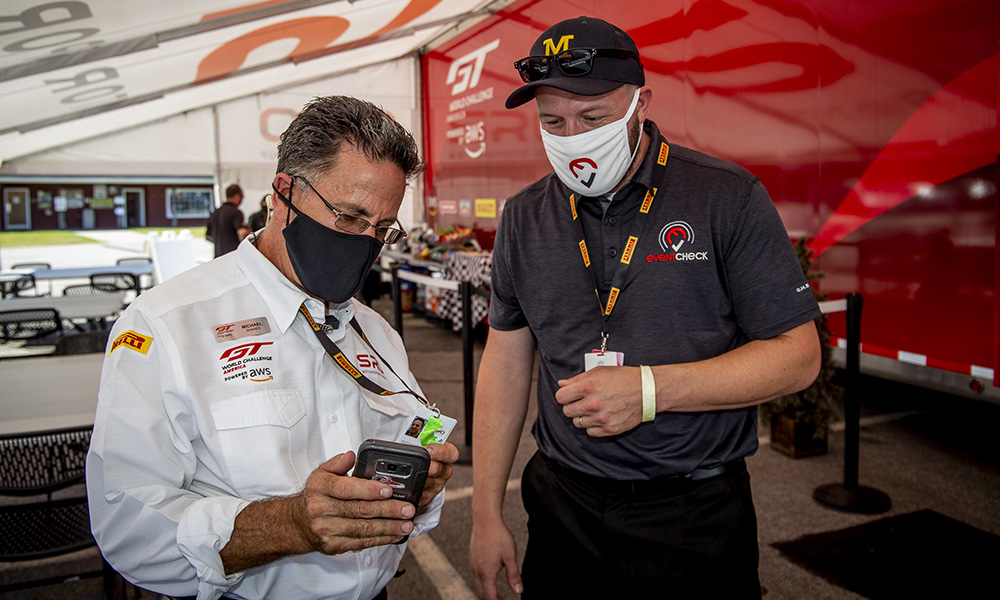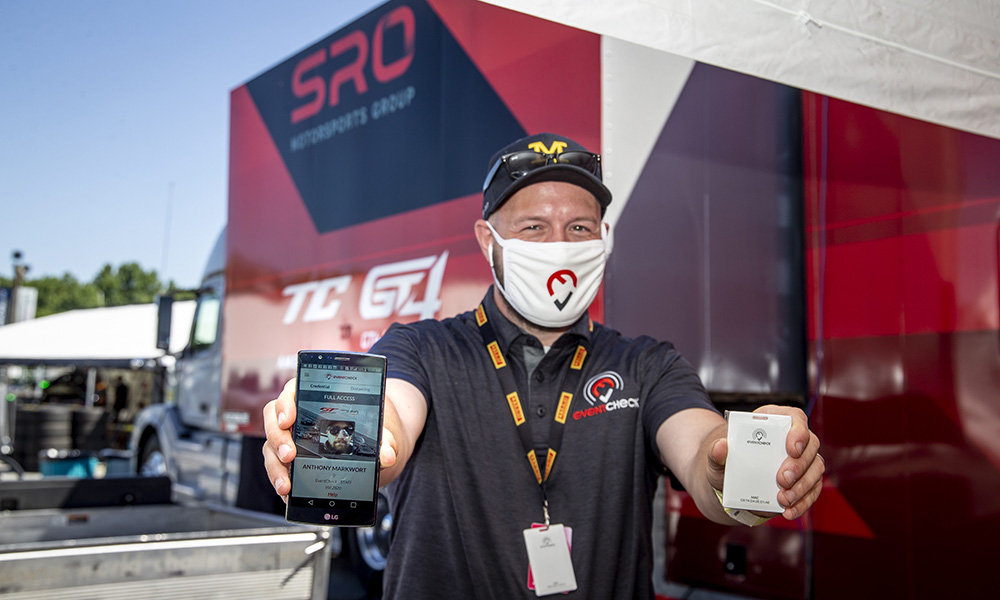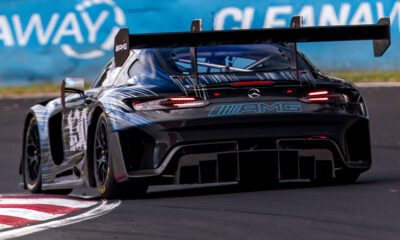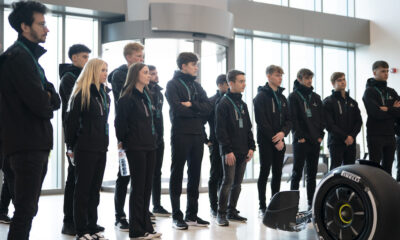
Photo: EventCheck
While motorsports has restarted nearly across all corners of the globe, SRO America is arguably one of the best-prepared series to handle and mitigate potential COVID-19 cases amid the ongoing coronavirus pandemic, thanks to the implementation of an innovative contact tracing and virtual credentialing app.
EventCheck, rolled out during the Virginia International Raceway event earlier this month, is the brainchild of Apex Broadcast founder Clark Cambern and business partner Anthony Markwort, and has generated interest both in the motorports industry as well as other event-based businesses.
The app, coupled with a Bluetooth LE-enabled SmartID credential, allows for contactless registration, security checks, social distancing alarms and anonymous contact tracing that could prove vital to keeping series operational in the event of positive COVID-19 cases within the paddock.
According to Cambern, whose company handles TV production for SRO America races, the idea for the app was born out of SRO America’s season-opening weekend at Circuit of The Americas in March, when COVID-19’s impact on world events quickly became apparent.
“We had our COTA event and things started to get kind of strange [in the world]. We heard that South by Southwest was canceled that week and MotoGP had canceled their event,” Cambern told Sportscar365.
“As soon as I came home, I was like, ‘Man, I really need to think through how we can keep everyone working.’
“At that time I think everybody realized that racing was a potential situation where we could continue [during COVID-19]. We’re not a team sport but the reality is that we have 1,000-2,000 people on the ground at any given pro event, even without fans.
“There are some real needs to show government authorities, the tracks and insurers that we’re being responsible.”
Cambern and Markwort, whose day job is in government advocacy, went to work on the concept and incorporated in April, prior to the beta version of the app for Android devices debuting at VIR.
While having noted some hesitation from SRO America teams during the event, Markwort says that privacy has been a “guiding principal” for them in the app’s development and one of the reasons why they’ve elected not to utilize Apple and Google’s new API for contact tracing.
Instead, each person’s phone serves as a passive receiver to the SmartID, which does not track a user’s location in real time but rather logs data when a person comes into close contact with another person that’s not in their registered ‘cell.’
The user’s cell phone also vibrates in this instance, as a form of warning.
Both Cambern and Markwort stressed that SRO America, nor any organization other than EventCheck, has access to the data, which is stored in a secure AWS cloud database.
“We want to get into the situation where we can keep everybody racing with a solution that is focused on protecting people’s privacy,” Markwort told Sportscar365.
“That’s been a guiding theme for us. How can we put a product out that meets all of the requirements and still keeps people’s private information as private as it can possibly be?”
Cambern said the system is only functional when checked into the specific event, with the database link disconnected once the race weekend is over. Users are able to keep the SmartID with them between events.
While only fully functional for Android users at VIR, Cambern said they are “very confident” that the app will available in the iOS store in time for the next month’s SRO America event at Sonoma Raceway, which would then provide a full-scale implementation.

Photo: EventCheck
Multiple Use Cases for EventCheck
While admittedly getting the idea from the current pandemic, Cambern said EventCheck has the capability to solve a number of other “pain points” in motorsports, as well as for events in general.
The app has the capability to offer contactless registration, authentication, emergency messaging and even virtual credentials and access, such as parking passes.
“I think COVID has provided the impetuous for everybody to consider this,” Cambern said. “But we’re hoping to be around for the long-term.
“I think the same system could easily be used for any kind of live event. It could be business conferences, stick-and-ball sports, events like SXSW… Basically any event where there is a closed community of people for a fixed duration.”
Cambern said they’re also looking at other use cases, including in the business and educational sectors.
“Our long-term goal, beyond COVID, is to develop a system that addresses some of the pain points we’ve seen both in racing and other kinds of events for a long time,” he added.
“We really want to get there and I think SRO is an excellent partner to develop those modules. They’re really great people to work with and we have a longstanding relationship.
“Racing is a really good test bed for a lot of stuff. Logistically, it’s a lot more challenging than just about any event on earth.
“It allows us to test and develop a lot of these systems before rolling them out to other markets really effectively.”
Markwort added: “What’s really exciting is taking the credential from where it is now to where it could be in the future, where the phone has gone from a flip phone to a smartphone.
“It’s taking that credential and making that credential smart.”


























